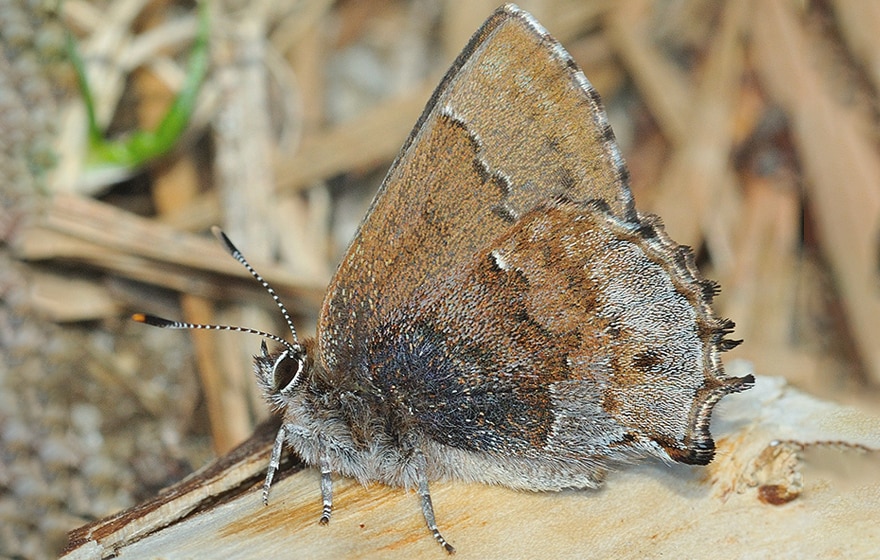MassWildlife’s Natural Heritage and Endangered Species Program conserves and protects the most vulnerable animal and plant species of Massachusetts and the habitats upon which they depend.
Description
Common name: Frosted elfin
Scientific name: Callophrys irus
Size: Wingspan about 1 inch; about ½ inch long when at rest with wings folded back (see photo)
Range: Southern New Hampshire south to northern Florida and west to Wisconsin and eastern Texas; colonies are rare and local throughout this range
MA conservation status: Special concern
Federal conservation status: Not listed
Fun facts
- The frosted elfin is one of six “elfin” butterflies in Massachusetts, all of which are relatively small, brown butterflies that are only found in the adult stage in the spring.
- After mating, the female frosted elfin lays eggs on one of only two caterpillar food plants, either sundial lupine (Lupinus perennis) or yellow wild indigo (Baptisia tinctoria).
- By mid-summer all caterpillars are fully grown, and they then transform into a chrysalis in a sheltered location (usually under leaf litter on the ground), where they are inactive through the winter.
- Unlike wide-ranging butterflies like the monarch, the frosted elfin lives in localized colonies, with most individual butterflies never leaving the habitat occupied by previous generations.
- Frosted elfin habitat includes grassy openings in pitch pine-scrub oak barrens, but also less natural habitats such as utility line rights-of-way, railways, old sand and gravel pits, and the margins of airfields.
Threats and conservation
- The frosted elfin is relatively rare in Massachusetts, currently only known from about two dozen sites across the state.
- Threats to the frosted elfin include habitat loss and exclusion of disturbance such as fire. Fire promotes growth of lupine and wild indigo, and maintains the open habitat structure needed by both the frosted elfin and its food plants.
- MassWildlife has conducted prescribed fire at Frances Crane WMA, Montague Plains WMA, and Southeast Pine Barrens WMA, and this work has benefited the frosted elfin.
- The frosted elfin is considered an “at risk” species by the U.S. Fish & Wildlife Service, meaning that it is a priority for proactive conservation efforts.
How you can help
- The six different elfin species in Massachusetts can be difficult to tell apart until one has some practice doing so. However, if you are an experienced butterfly observer, or if you manage to obtain a clear, close-up photograph, please report any observations of the frosted elfin to MassWildlife’s Natural Heritage and Endangered Species Program (NHESP). Click here for instructions to submit rare species observations.
-
MassWildlife's Natural Heritage and Endangered Species Program is responsible for the conservation and protection of over 400 rare animals and plants, including frosted elfin. This work is primarily funded through grants and donations from supportive citizens. Support rare species conservation in Massachusetts—donate today!
